Improving your IELTS Writing Task 2 score can be challenging, but with the right strategies and practice, you can achieve a higher score. Here are the top 21 strategies to help you improve your IELTS Writing Task 2 score:
1. Understand the question and task requirements
Make sure you read the task instructions and understand the question fully before starting to write. Identify the essay type you need to write and what is being asked.
You should carefully read and comprehend the given Writing Task 2 prompt, including the topic and the instructions or requirements of the task. It is important to clearly understand what the essay question is asking and what type of essay you need to write.
You should be able to identify the key points, issues, or themes that the prompt is addressing, and ensure that your response addresses all of them fully and directly.
By understanding the question and task requirements, you can focus on writing a relevant and coherent essay that effectively answers the prompt and demonstrates your language skills.
Example
Here’s an example of how to understand the question and task requirements in an IELTS Writing Task 2 prompt:

To understand the question and task requirements in this prompt, you would need to do the following:
Identify the topic: The topic of this prompt is education.
Identify the task requirements: The task requires you to discuss both views (the idea that the government should provide free education and the idea that individuals should be responsible for their own education) and give your own opinion on the issue.
Understand the type of essay: This is a “discuss both views and give your opinion” type of essay, which means that you need to present both sides of the argument and then provide your own opinion.
By understanding the question and task requirements in this prompt, you can focus your writing on addressing the specific issues and requirements outlined in the prompt, which will help you to write a relevant and effective essay that meets the expectations of the task.
2. Focus on the task response
Make sure you answer the question asked in the prompt directly and fully. Don’t get sidetracked or provide information that is not relevant to the question.
“Focusing on the task response” in IELTS Writing Task 2 means addressing the prompt or question that is given accurately and fully in your essay. This means that you should write your essay with the specific topic and requirements of the task in mind and avoid going off-topic or writing about something irrelevant. It is important to carefully read and understand the prompt, identify the main topic, and respond to all parts of the question.

3. Plan your essay
Spend a few minutes planning your essay before you start writing. Create a basic structure and organize your ideas into paragraphs.
You should spend some time organizing your thoughts before you start writing your essay. This involves thinking about the main points you want to include, organizing them into paragraphs, and creating a basic structure for your essay.
Planning helps you to ensure that your essay is well-organized, coherent, and has a clear and logical flow of ideas. It also helps you to stay focused on the topic and avoid going off-topic or including irrelevant information.
Planning your essay is an essential step in the writing process, and it can help you to save time and improve the overall quality of your essay.
Example
Here’s an example of how you might plan your essay for an IELTS Writing Task 2 prompt:

Understand the question and task requirements
- Identify the type of essay: Discuss both sides and give your opinion
- Identify the main topic: The use of smartphones in public places
Plan your essay
Introduction:
- General statement about the topic
- Briefly state the two sides of the argument
- Thesis statement with your opinion
Body paragraph 1:
- Discuss the reasons why some people support the ban on smartphone use in public places
- Provide evidence to support this view
Body paragraph 2:
- Discuss the reasons why some people oppose the ban on smartphone use in public places
- Provide evidence to support this view
Body paragraph 3:
- Present your opinion and reasons for it
- Provide evidence to support your view
Conclusion:
- Summarize the main points of the essay
- Restate your opinion and reasons for it
By planning your essay in this way, you have a clear idea of what you want to write and how you will structure your essay. This will help you to write a well-organized, coherent, and persuasive essay that addresses the task requirements and demonstrates your language skills effectively.
4. Practice brainstorming
“Practice brainstorming” means developing the skill of generating ideas quickly and effectively in response to a given topic. This is an essential skill for the task as it helps you come up with relevant ideas and arguments to support your essay. Brainstorming can involve techniques such as mind mapping, free writing, listing, or clustering, depending on your preference.
Practicing brainstorming can help you improve your ability to think critically and creatively, and to organize your thoughts in a logical and coherent way. This will enable you to write a well-structured essay that effectively addresses the task and demonstrates your understanding of the topic.
Here are some examples of techniques that you can use to practice brainstorming for IELTS Writing Task 2:
Mind mapping
This involves writing down the main topic in the center of a page and then branching out into related ideas or subtopics. You can use colors, symbols, and arrows to link different ideas and create a visual representation of your thoughts.
Suppose the IELTS Writing Task 2 topic is “Advantages and disadvantages of social media.” You could create a mind map by writing “Social Media” in the center of a page and branching out into related ideas, such as “Connectivity,” “Information Sharing,” “Cyberbullying,” “Privacy Concerns,” and “Time Wasting.” You can then link these ideas with lines or arrows.
The following are a few examples of brainstorming for “advantages of studying abroad:”

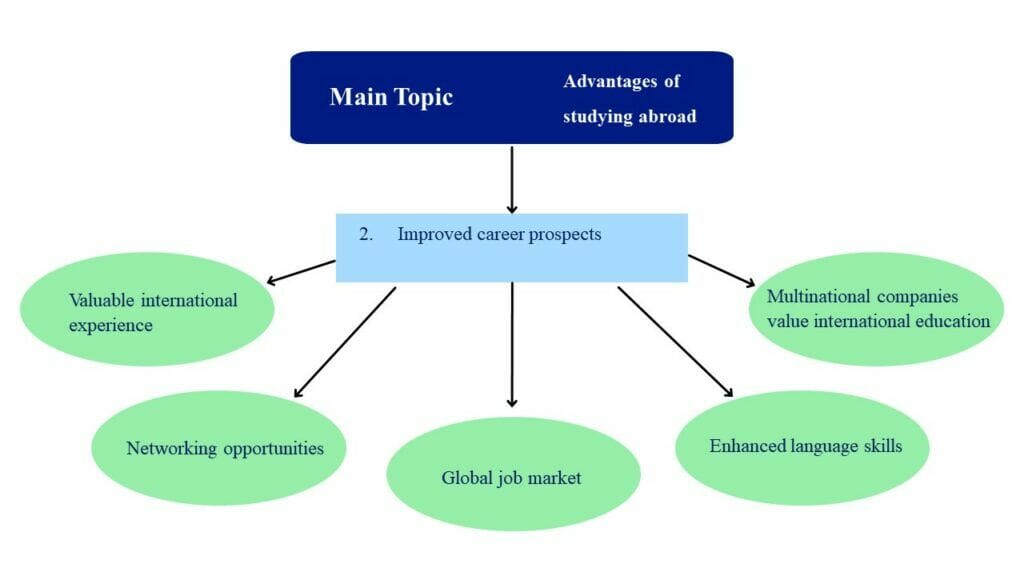


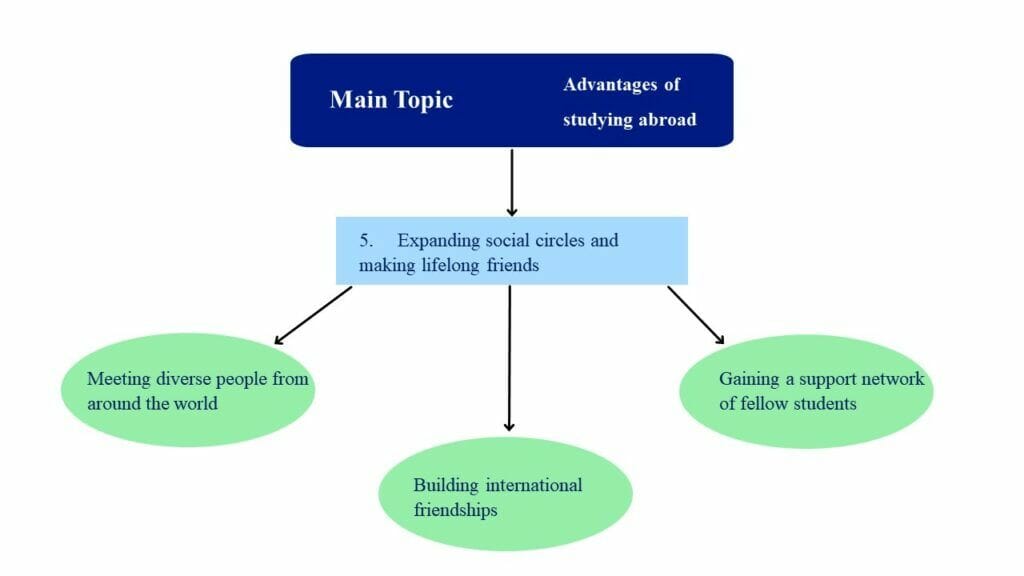
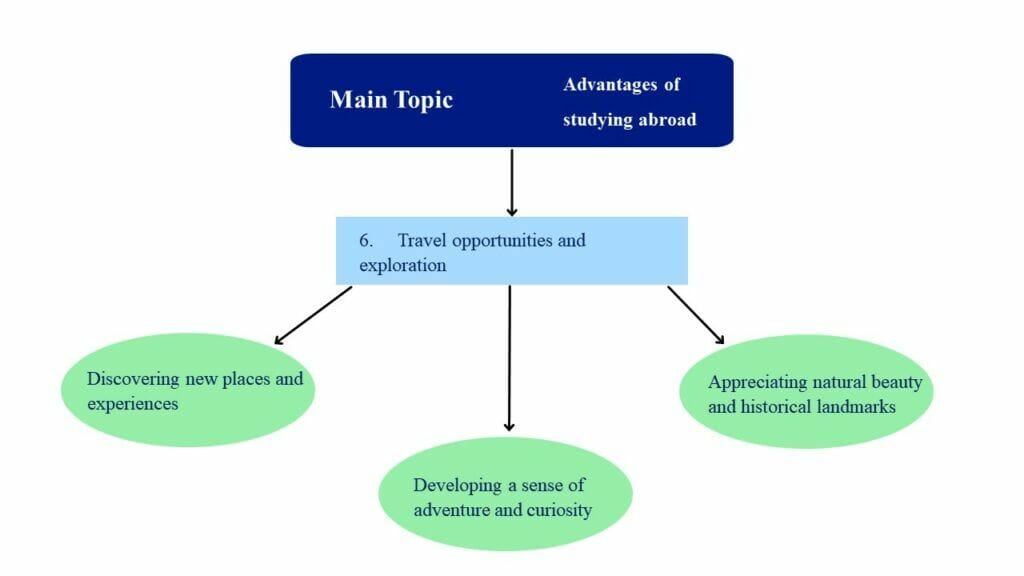

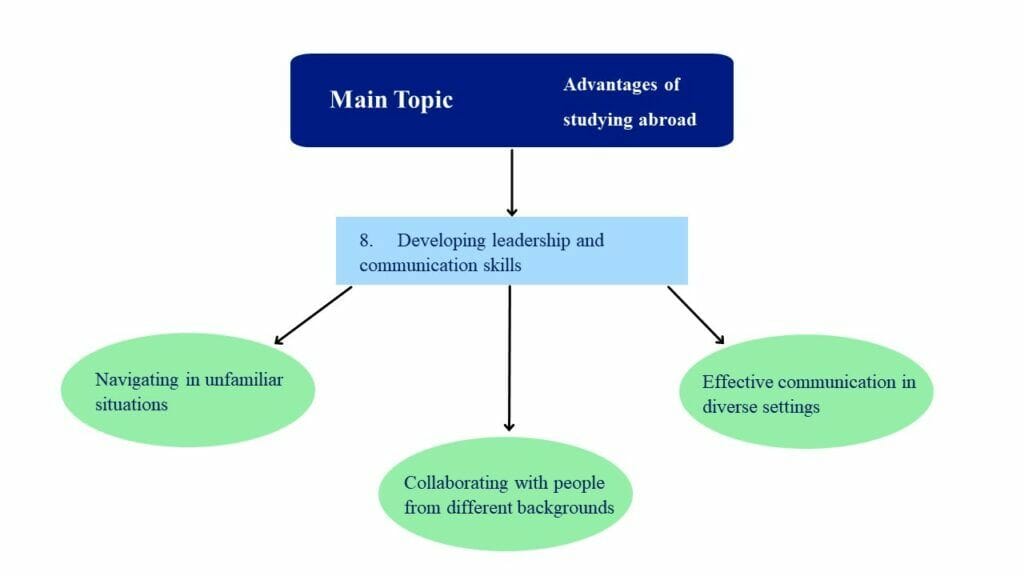
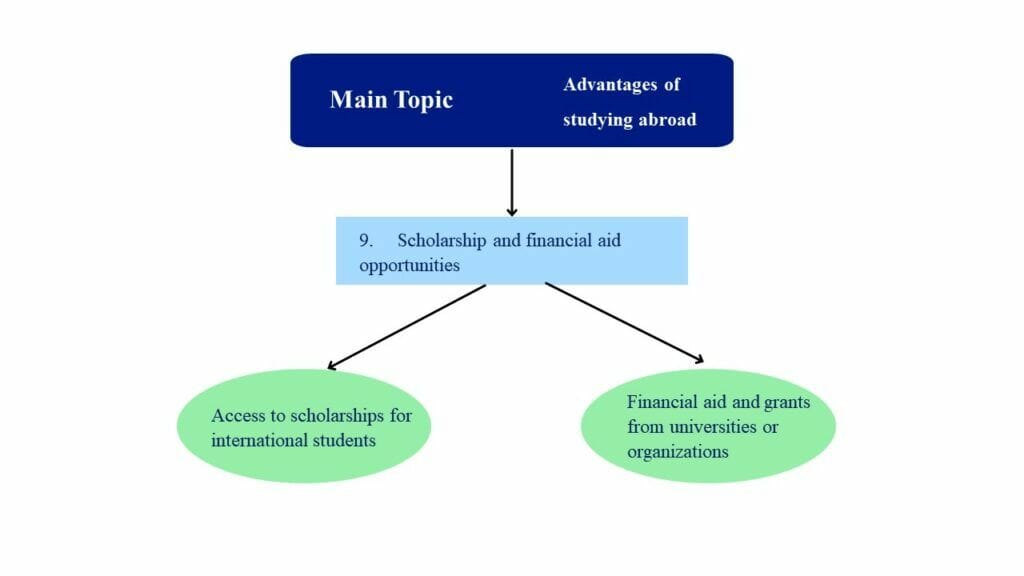
Free writing
This involves writing continuously for a set amount of time without stopping to edit or revise your ideas. The goal is to generate as many ideas as possible, even if they seem unrelated or incomplete at first.
Set a timer for five minutes and write down as many ideas as you can related to the IELTS Writing Task 2 topic “Environmental problems and solutions.” Write continuously without stopping or editing. Your free writing could include ideas like “Pollution from factories and cars,” “Climate change,” “Renewable energy sources like solar and wind power,” “Public transportation,” and “Recycling programs.”
Listing
This involves writing down a list of related ideas or examples in response to the task. You can use bullet points or numbered lists to organize your ideas.
Make a list of ideas in response to the IELTS Writing Task 2 topic “The impact of technology on society.” You might list ideas such as “Increased connectivity,” “Increased productivity,” “Automation of jobs,” “Privacy concerns,” “Cybersecurity risks,” and “Social isolation.”
By practicing these techniques, you can develop your ability to generate and organize ideas quickly and effectively. This will help you to write a strong and coherent essay that addresses the task and demonstrates your understanding of the topic.
5. Write at least 250 words
You are required to write an essay consisting of a minimum of 250 words. Your essay should have a clear introduction, body paragraphs, and a conclusion, and should address the topic and the question prompt provided in the task.
It is important to note that writing fewer than 250 words will result in a penalty, as you will not have fully addressed the task requirements. On the other hand, writing more than 250 words is allowed, but it is recommended that you do not exceed the limit by too much, as you may run out of time and end up with an incomplete essay. The best recommendation is to write about 260-280 words.

Therefore, it is important to carefully manage your time during the exam, plan your essay structure, and allocate sufficient time for writing, editing, and proofreading to ensure that you meet the minimum word count and provide a well-written and coherent response to the task prompt.
6. Use appropriate paragraph structure
In IELTS Writing Task 2, “use appropriate paragraph structure” means organizing your essay into paragraphs that are clear, logical, and well-structured. This involves dividing your essay into several paragraphs with each paragraph focusing on one main idea or point.
For example, each body paragraph should begin with a clear topic sentence that states the main point of the paragraph, followed by supporting sentences that reinforce the main claim, and developing sentences that provide evidence, examples, or explanation to develop the supporting point further. It’s important to ensure that each paragraph is coherent, with sentences that are connected in a logical and meaningful way.
Using appropriate paragraph structure is important because it helps to make your writing easier to read and understand. It also helps to organize your ideas in a way that makes your argument clear and easy to follow, which can help to improve your overall score in the IELTS Writing Task 2.
Example
Here’s an example of appropriate paragraph structure in an IELTS Writing Task 2 essay:

Introduction paragraph:

2. State the main issue/ question to be discussed.
3. Provide a brief overview of the essay’s main points.
Social media has become an integral part of modern society, with millions of people around the world using platforms such as Facebook, Twitter, and Instagram to connect with others and share information. However, there is an ongoing debate about the impact of social media on society, with some arguing that it has a negative effect on individuals and communities. In this essay, I will discuss both views on this issue and give my opinion on whether social media is ultimately beneficial or harmful to society.
Body Paragraph 1: Negative impacts of social media

2. Provide supporting sentences that explain and illustrate the main point.
3. Use examples or evidence to support your argument.
On the one hand, there are many negative impacts of social media on society. For instance, some people argue that social media can contribute to feelings of anxiety, depression, and low self-esteem, particularly among young people. This is because social media often presents an idealized and unrealistic view of other people’s lives, leading individuals to compare themselves unfavorably to others. In addition, social media can be a source of misinformation and fake news, which can spread rapidly and have negative consequences for individuals and society as a whole.
Body Paragraph 2: Positive impacts of social media
- Begin with a topic sentence that states the main point of the paragraph.
- Provide supporting sentences that explain and illustrate the main point.
- Use examples or evidence to further develop your argument.
On the other hand, there are also many positive impacts of social media on society. For example, social media can be a powerful tool for promoting social and political change, as seen in the use of social media to organize and mobilize protests in various countries around the world. Additionally, social media can provide a platform for marginalized groups to share their perspectives and connect with others who share their experiences. Finally, social media can facilitate communication and relationships across distances, making it easier for people to maintain connections with friends and family who live far away.
Conclusion paragraph

2. Give your opinion on the topic and provide a final comment or recommendation.
In conclusion, while social media certainly has some negative impacts on society, it also has many positive ones. Ultimately, whether social media is beneficial or harmful to society depends on how it is used and by whom. As such, it is important to approach social media use critically and responsibly, recognizing both its potential benefits and drawbacks.
7. Use a range of grammatical structures and vocabulary
In IELTS Writing Task 2, you should vary your sentence structures and use a variety of vocabulary to showcase your language proficiency.
This means you should try to avoid using the same sentence structures and vocabulary repeatedly throughout your essay.

Instead, aim to use a mix of simple, compound, and complex sentences, as well as a range of vocabulary that accurately conveys your ideas and opinions.
Using a variety of grammatical structures and vocabulary will demonstrate your ability to express yourself fluently and accurately in English, which is an essential component of achieving a high score in the IELTS exam.
Examples
Here are some examples of how you can use a range of grammatical structures and vocabulary in your IELTS Writing Task 2 essay:
Grammatical Structures
- Simple sentence: Dogs make great pets.
- Compound sentence: Dogs are loyal, and they can protect their owners from danger.
- Complex sentence: Although some people prefer cats, dogs are more popular because of their loyalty and protective nature.
Vocabulary
Synonyms: Instead of using the same word repeatedly, you can use synonyms to add variety to your writing. For example, instead of repeatedly using the word “happy”, you can use “delighted”, “pleased”, “content”, “joyful”, etc.
Collocations: These are words that frequently occur together in English, such as “make a decision”, “take into account”, “play a role”, etc.
Academic idioms: These are expressions that have a figurative meaning that is different from the literal meaning of the words. For example, “to put into perspective” means to consider something in relation to other things or to see it in a larger context.
Using a variety of grammatical structures and vocabulary can help you to express your ideas more clearly and effectively, which can improve your overall score in the IELTS exam.
8. Use appropriate transition words
Use transition words and phrases to link your ideas and make your writing cohesive.
In IELTS Writing Task 2, using appropriate transition words means using words or phrases that connect and link ideas within and between sentences, paragraphs, and sections of your essay in a cohesive and logical way.
Transition words help to guide the reader through your argument, highlighting the relationships between ideas, and making your writing more organized, clear, and easy to understand.
Examples of transition words include ‘however’, ‘nevertheless’, ‘in addition’, ‘furthermore’, ‘on the other hand’, ‘in conclusion’, etc. By using transition words effectively, you can improve the flow and coherence of your writing and achieve a higher score in the IELTS Writing Task 2.
Examples
Here are some examples of transition words and phrases you can use in your IELTS Writing Task 2:
Adding information:
- Additionally,
- Moreover,
- Furthermore,
- In addition,
- Also,
- Not only…but also
Example: Not only does regular exercise benefit your physical health, but it also has a positive impact on your mental well-being. Additionally, it can help to reduce stress and improve sleep quality.
Contrasting:
- However,
- Nevertheless,
- Nonetheless,
- On the other hand,
- In contrast,
- Although
Example: Although technology has made our lives easier in many ways, it has also had some negative effects. On the other hand, some argue that it has created a sense of isolation and decreased face-to-face communication.
Giving examples:
- For example,
- For instance,
- Such as,
- Including
Example: Many people believe that a vegetarian diet is healthier than a meat-based one. For instance, a study found that vegetarians tend to have lower rates of heart disease and certain types of cancer.
Summarizing:
- In conclusion,
- To sum up,
- In summary,
- Overall,
- All in all
Example: In conclusion, it is clear that the benefits of learning a second language outweigh the challenges. Overall, it can broaden your cultural horizons, improve your job prospects, and enhance your cognitive abilities.

Using transition words and phrases like these will help to make your writing more coherent and cohesive, improving your overall score in the IELTS Writing Task 2.
9. Use examples and evidence to support your arguments
Provide specific examples and evidence to support your arguments and strengthen your writing.
In IELTS Writing Task 2, you are required to write an essay expressing your opinion or presenting an argument on a given topic. The instruction to “use examples and evidence to support your arguments” means that you should provide specific examples and evidence to support your ideas and opinions.
Examples can be personal experiences, observations, or real-life situations that illustrate your point. Evidence refers to facts, statistics, research findings, or expert opinions that back up your argument. By providing examples and evidence, you can demonstrate that your argument is well-reasoned.
When providing examples and evidence, it’s important to make sure they are relevant to your argument and support your main point. Using examples and evidence effectively can help you to persuade the reader of your point of view and achieve a higher score in the IELTS Writing Task 2.
Example
Let’s see how you can use examples and evidence to support your arguments in IELTS Writing Task 2:
Topic: Some people think that children should start learning a foreign language at primary school. Do you agree or disagree with this statement?
Argument: I agree that children should start learning a foreign language at primary school.
Example of using evidence: Research has shown that children’s brains are more receptive to learning a foreign language at a young age. According to a study published in the Journal of Educational Psychology, children who started learning a second language in primary school outperformed those who started learning it later in secondary school.
Example of using examples: Learning a foreign language at a young age can also have practical benefits. For example, a friend of mine who learned Spanish in primary school was able to use her language skills to communicate with Spanish-speaking clients when she started working as a customer service representative in a global company.
10. Stay on topic
Don’t go off-topic or write about something that is not related to the question asked.
In IELTS Writing Task 2, “stay on topic” means that you should focus on the question prompt and write a response that directly addresses the given topic. It is important to stay relevant and not to go off-topic or write about unrelated issues.
When you are asked to write an essay, you will be given a topic or a question prompt that you need to respond to. To stay on topic, you should make sure that you address the question prompt directly and avoid introducing irrelevant or unrelated information. Your essay should clearly and directly address the topic or question prompt, demonstrating your understanding of the topic and your ability to communicate your ideas effectively.
Example
Here’s an example to help illustrate the concept of staying on topic in IELTS Writing Task 2:

Staying on topic
In response to this prompt, staying on topic means that you should address both the positive and negative impacts of technology on our lives in terms of convenience and complexity. You should discuss arguments on both sides of the issue, presenting evidence and examples to support your points. Finally, you should provide your opinion on the matter, based on the arguments you have presented.
Going off-topic
If you were to write about how technology has improved healthcare, for example, without addressing the impact of technology on convenience and complexity, then you would be going off-topic. Similarly, if you were to only discuss the negative impacts of technology without considering the positive impacts, you would not be fully addressing the question prompt.
Therefore, it is important to stay focused on the given topic and make sure that your essay is relevant and directly addresses the question prompt.
11. Check your grammar and spelling
Proofread your writing for grammar and spelling errors. Use grammar check tools or ask a teacher or tutor to check your work.
You should review and revise your essay for any errors in grammar, punctuation, spelling, and sentence structure. This is an important aspect of the task, as it demonstrates your ability to communicate effectively in written English.
To achieve a high score in the IELTS writing task 2, it is essential that your essay is well-structured, coherent, and free of grammatical and spelling errors. Therefore, you should take the time to proofread your work carefully and make necessary corrections before submitting your essay. This will help to ensure that your ideas are clearly expressed and easily understood by the reader.
Examples
Here are some examples of common grammatical and spelling errors that you should check for in your IELTS writing task 2:
Subject-verb agreement errors
Make sure that the subject of your sentence agrees in number (singular or plural) with the verb. For example, “The dog barks” is correct, while “The dog bark” is incorrect.
Pronoun errors
Be careful to use the correct pronoun to refer to people or things. For example, “He gave the book to her” is correct, while “Him gave the book to she” is incorrect.
Run-on sentences
Check that you have not joined two independent clauses together without proper punctuation or conjunctions. For example, “I went to the store I bought some groceries” is a run-on sentence. You could fix it by adding a comma and coordinating conjunction: “I went to the store, and I bought some groceries.”
Spelling mistakes
Double-check the spelling of all words in your essay, including commonly misspelled words. For example, “definitely” is often misspelled as “definately.”
Punctuation errors
Make sure that you use correct punctuation, including commas, periods, and quotation marks. For example, “She said, ‘I love you’” is correct, while “She said ‘I love you’” is incorrect.
These are just a few examples of the types of errors you should look out for. Always review your work carefully and seek feedback from others to ensure that your essay is error-free and easy to understand.
12. Practice writing essays regularly
Write essays on different topics to improve your writing skills.
It is important for you to develop and improve your essay-writing skills through consistent practice. This means regularly setting aside time to write essays on various topics, preferably under timed conditions similar to those of the actual IELTS exam. By doing so, you can improve your ability to organize your thoughts, express your ideas clearly and coherently, and use appropriate grammar and vocabulary. Consistent practice can help build confidence and familiarity with the task, leading to better performance on the actual exam.

Remember to use official IELTS Writing Task 2 answer sheets when practicing and count the words you have written. This will help you realize how many lines you need to write on the official answer sheet for a 260-280 words essay.
13. Use a timer
Practice writing essays under time pressure to simulate real test conditions. Time yourself (set a time limit) when writing practice essays to simulate the real test conditions and improve your time management skills.
This is a helpful strategy to manage your time effectively and ensure that you can complete the task within the given time frame.
When you use a timer during IELTS Writing Task 2, you will have a specific amount of time to plan, organize, write, and edit your essay. By doing so, you will be able to pace yourself appropriately, stay on track, and avoid spending too much time on any one section of the task.
- Before you start writing, set a timer for 40 minutes (the amount of time you have to complete the task).
- Spend the first 5-10 minutes analyzing the question, brainstorming ideas, and outlining your essay.
- Start writing your essay, keeping an eye on the timer to ensure you are pacing yourself appropriately.
- Try to complete your essay in 25-30 minutes, leaving about 5 minutes for editing and proofreading.
By using a timer, you can train yourself to work efficiently under time constraints and avoid getting stuck on any one part of the task. It’s important to practice this technique regularly to improve your time management skills and maximize your chances of success on the IELTS Writing Task 2.
14. Read sample essays
Read high-scoring sample answers to see how other writers approach the task and how they structure their essays.
You should review and analyze existing essays that have been written on the same or similar topics to the one you will be writing about. These sample essays can be found in IELTS preparation materials or online.
Reading sample questions and high-scoring model answers can be beneficial for several reasons:
- It can help you understand the format, structure, and tone of an IELTS essay.
- It can provide you with ideas and inspiration for your own essay.
- It can help you identify common mistakes and pitfalls to avoid.
- It can improve your vocabulary and sentence structure.
- It can help you become familiar with the types of arguments and evidence that are typically used in IELTS essays.
Overall, reading sample essays can be a helpful strategy to improve your writing skills and prepare for the IELTS writing task 2.
15. Use appropriate tone and register
Use an appropriate tone and register for your essay, depending on the audience and purpose.
You should write your essay in a way that is suitable for the academic context of the test.
Tone refers to the writer’s attitude toward the topic, and it should be objective, formal, and serious. You should avoid using colloquial language, slang, or informal expressions in your essay.
Register refers to the level of formality of the language used. In IELTS Writing Task 2, you should use a formal register that is appropriate for academic writing. This means using complete sentences, proper grammar and vocabulary, and avoiding contractions, abbreviations, and overly colloquial language.

In summary, when you are asked to use an appropriate tone and register in IELTS Writing Task 2, you should write in a formal and objective way, using appropriate vocabulary, grammar, and sentence structures that are suitable for academic writing.
Example
Here are some examples of how to use appropriate tone and register in IELTS Writing Task 2:
Use formal vocabulary
Instead of using informal words or phrases like “stuff,” “cool,” or “totally,” use more formal language like “items,” “excellent,” or “completely.”
Use complex sentence structures
Instead of using simple sentences, use complex sentence structures like relative clauses, passive voice, or conditional sentences to show a higher level of language proficiency.
Avoid contractions
In academic writing, contractions should be avoided. Instead of writing “don’t,” write “do not.”
16. Use clear and concise language
You should express your ideas in a clear, simple, and straightforward manner, using language that is easy to understand for the reader. You should avoid using complicated or technical terms that the reader may not be familiar with.

Clarity and conciseness help to make your writing more effective and ensure that the reader can follow your argument or ideas easily. Using clear and concise language can also help you to save time, as you will be able to express your ideas more quickly and efficiently.
Here’s an example of clear and concise language:
Unclear and wordy: The vast majority of people in contemporary society, particularly the younger generation, seem to have a predilection for utilizing social media platforms as a primary means of communication with others.
Clear and concise: Most people, especially younger generations, prefer social media for communication.
Here’s another example of clear and concise language:
Unclear and wordy: There are numerous factors that contribute to the issue of global warming, including the excessive use of fossil fuels, deforestation, and industrial pollution.
Clear and concise: Global warming is caused by the overuse of fossil fuels, deforestation, and industrial pollution.
17. Avoid repetition of words and ideas
You should try not to use the same words or phrases too frequently in your essay. Additionally, you should also avoid repeating the same ideas or arguments throughout your essay.
Using a wide range of vocabulary and expressing your ideas in different ways can help you avoid repetition in your writing. This will make your essay more interesting to read and will also demonstrate your ability to use language effectively.
To avoid repeating ideas, you should aim to present a range of arguments or perspectives on the topic you are writing about. You can do this by considering different viewpoints or exploring different aspects of the issue. This will help to demonstrate your ability to think critically and to present a balanced argument.
Here are some examples to illustrate how to avoid repetition of words and ideas in IELTS Writing Task 2:
Repetition of words
Original sentence: “Many people believe that technology has had a negative impact on society, but technology has also brought many benefits.”
Revised sentence: “Although technology has been criticized for its negative effects on society, it has also provided numerous benefits.”
In this example, the word “technology” is repeated twice in the original sentence. By rephrasing the sentence, the word “technology” is only used once, which makes the sentence more concise and interesting to read.
Repetition of ideas
Original sentence: “In conclusion, there are many benefits of studying abroad. Studying abroad can help students improve their language skills, gain new experiences, and meet people from different cultures.”
Revised sentence: “To sum up, studying abroad provides a range of advantages. For example, students can enhance their language proficiency, broaden their horizons, and establish friendships with people from diverse backgrounds.”
In this example, the original sentence repeats the same idea that studying abroad is beneficial. By rephrasing the sentence and using different examples, the revised sentence avoids repetition of the same ideas and demonstrates the ability to present a more varied argument.
These are just a few examples, but the key is to be mindful of your language choices and to vary your vocabulary and sentence structure where possible to avoid repetition.
18. Develop critical thinking skills
Develop your critical thinking skills by analyzing arguments and evaluating evidence.
You should be able to analyze and evaluate the information provided, identify the strengths and weaknesses of arguments, and use evidence to support your own perspective. This involves looking at an issue from different angles and considering multiple perspectives before coming to a conclusion.
Critical thinking is an important skill in academic writing, and it is often required to score high on IELTS Writing Task 2. To develop critical thinking skills, you should practice reading and analyzing different texts, and try to identify the main arguments and supporting evidence. Additionally, you should learn to question assumptions and evaluate the credibility of sources, as well as develop your own arguments and support them with evidence.

Here are some examples of how you can develop critical thinking skills in IELTS Writing Task 2:
Analyzing Arguments
One way to develop critical thinking skills is to practice analyzing arguments.
For example, when you read an article or a passage, try to identify the main argument, the supporting evidence, and the assumptions underlying the argument. Ask yourself questions such as: What evidence is presented to support the argument? Are there any logical fallacies or inconsistencies in the argument? Does the author present any counterarguments or alternative perspectives?
Developing Your Own Arguments
To develop critical thinking skills, you should also learn to develop your own arguments and support them with evidence. For example, when you are writing your essay, try to identify the main points you want to make and the evidence you will use to support your argument. Ask yourself questions such as: What evidence is most relevant and convincing? Are there any counterarguments or alternative perspectives that I need to address? How can I present my argument in a clear and logical way?
19. Get feedback on your writing
You should seek the opinion of an experienced English language teacher, tutor, or native speaker on your writing. This feedback can help you identify any weaknesses or errors in your writing and provide you with guidance on how to improve your writing skills.
It is essential to get feedback on your writing as it can help you improve your writing skills, increase your confidence, and get a better understanding of what the IELTS examiners are looking for. By receiving feedback, you can identify your strengths and weaknesses and work on them to improve your writing score.
Therefore, it is recommended that you have your writing reviewed by a qualified IELTS tutor or teacher who can provide you with constructive feedback, identify areas for improvement, and suggest strategies for enhancing your writing skills.
Here are some examples of the types of feedback you might receive on your IELTS Writing Task 2:
Grammar and Vocabulary
Feedback on your grammar and vocabulary use is important, as these are key elements that impact your overall score. The tutor might point out errors in tense, subject-verb agreement, and sentence structure, and suggest vocabulary words that you could have used instead.
Cohesion and Coherence:
Feedback on the coherence and cohesion of your essay is also important. The tutor might suggest ways to link your ideas more clearly, use appropriate transition words and phrases, and structure your essay in a logical and clear way.
Task Response
Feedback on how well you have addressed the task question is crucial. The tutor might analyze whether you have answered the question fully, supported your arguments with evidence, and presented a balanced view on the issue.
Feedback on Overall Essay Structure
Feedback on your essay structure can help you to understand how to organize your essay effectively. The tutor might suggest improvements to your introduction, body paragraphs, and conclusion to create a more cohesive and coherent essay.
Suggestions for Improvement
Feedback is not only about pointing out mistakes, but also suggesting ways to improve. The tutor might provide you with specific strategies to help you improve your writing skills, such as reading more academic texts, practicing writing under timed conditions, or using online resources to improve your grammar and vocabulary.
By receiving feedback in these areas, you can improve your writing skills, increase your confidence, and get a better understanding of what the IELTS examiners are looking for in a high-scoring essay.
20. Learn from your mistakes
Analyze your mistakes and learn from them. Identify areas where you need to improve and focus on those areas in your next practice session.
You should reflect on and analyze the errors you made in your previous writing attempts and use this knowledge to improve your future writing.
It is a reminder that mistakes are a natural part of the learning process and that you should view them as opportunities for growth rather than failures. By learning from your mistakes, you can identify the areas where you need to improve and develop strategies to overcome them. This can help you to write more effectively and achieve a higher score in your IELTS Writing Task 2.

Here are a few examples of how you can learn from your mistakes in IELTS Writing Task 2:
Identify common errors
Go through your previous writing attempts and identify the mistakes you made most often. For example, if you notice that you often make grammatical errors or struggle with spelling, you can focus on these areas during your practice sessions.
Analyze your feedback
If you have received feedback from a teacher or tutor, take the time to review it carefully. Look for patterns in the feedback and identify areas where you need to improve.
Keep a writing journal
Write down the mistakes you make in a journal as you practice. This will help you to track your progress over time and identify areas where you need to focus your attention.
21. Study credible references
It is important to use credible preparation material for IELTS Writing Task 2 for several reasons:
Accurate Assessment
Using credible preparation material ensures that you are being assessed on the same standards as the official IELTS test. This means that you are practicing with tasks and prompts that are relevant and representative of what you will encounter on the actual test.
Familiarity with Test Format
By using credible preparation material, you will be familiar with the test format and know what to expect on test day. This will help you feel more confident and relaxed during the actual test.
Quality of Material
Credible preparation materials are typically developed by experienced language experts and IELTS instructors who have a deep understanding of the test. As a result, the material is of higher quality and will provide you with more accurate information and useful strategies to help you succeed on the test.
Avoiding Misinformation
Using unreliable or inaccurate preparation material can lead to confusion and misinformation. This can result in poor preparation and lower scores on the actual test.
Improving Scores
Using credible preparation material can help you identify your strengths and weaknesses, which will enable you to focus on areas where you need more practice. This will help you improve your scores on the test and achieve your desired band score.
Overall, using credible preparation material for IELTS Writing Task 2 is crucial for effective preparation and achieving your desired band score on the actual test.
Final words
Improving your writing skills for IELTS Task 2 requires consistent practice, preparation, and a deep understanding of the exam’s assessment criteria. You must focus on practicing the strategies, regular writing practice, seeking feedback and corrections, improving grammar and vocabulary, and being familiar with the test format and time limits. By doing so, you can improve your writing skills and increase your chances of scoring well on the exam.

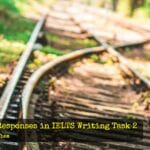



0 Comments